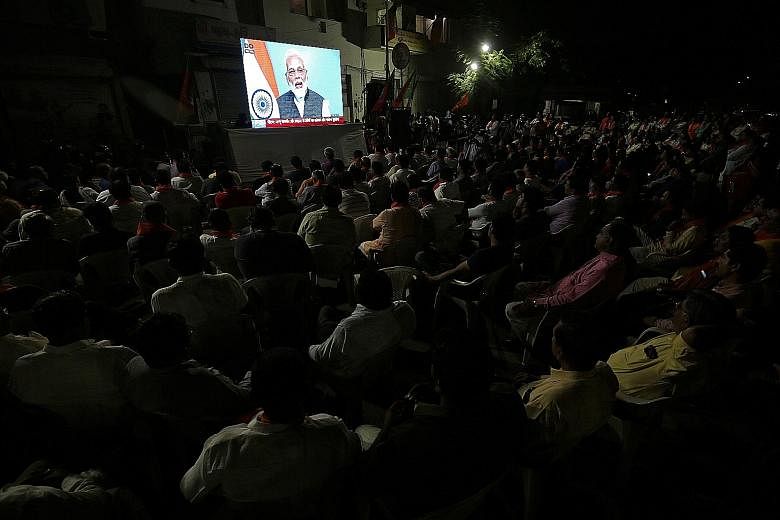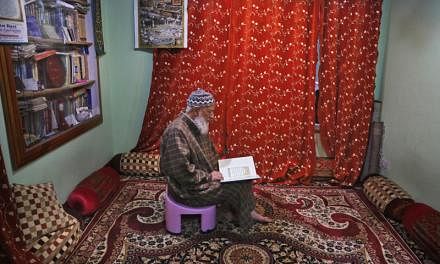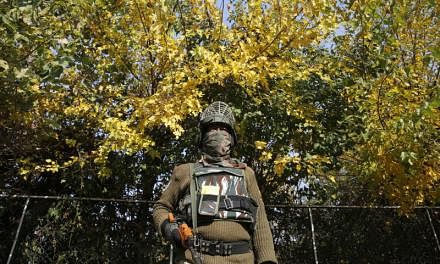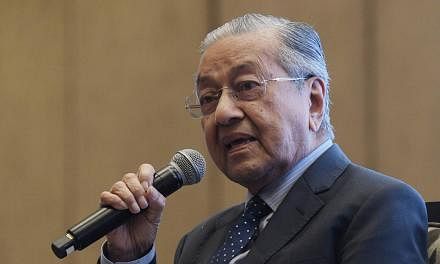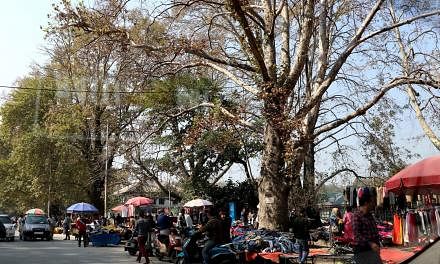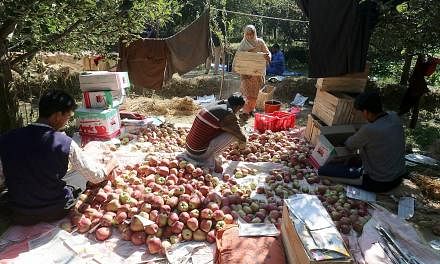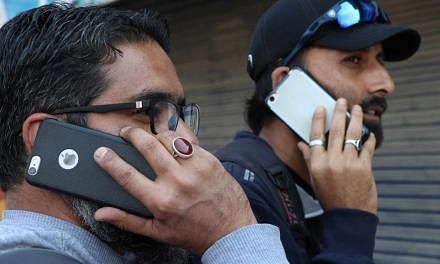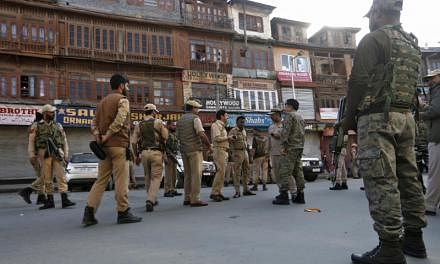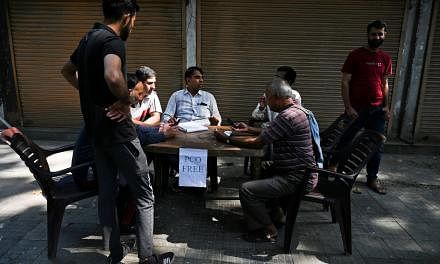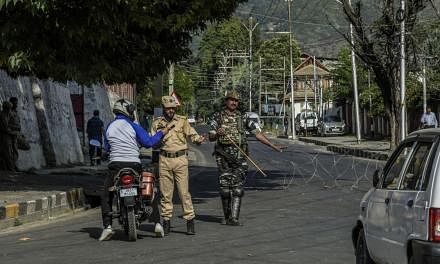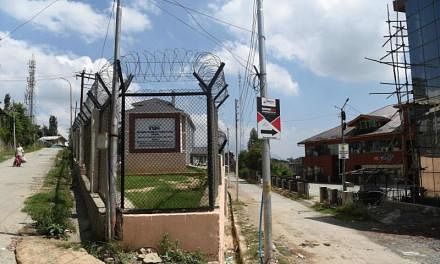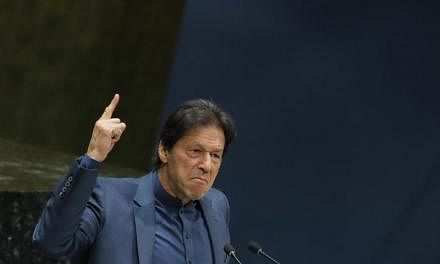Prime Minister Narendra Modi yesterday called the change in the status of Kashmir a "historic decision" that would secure the future of its people.
In a television address to the nation to explain the withdrawal of Jammu and Kashmir's special status - which had guaranteed a high degree of autonomy for the region - and the bifurcation of the state into the Union Territory of Ladakh and the Union Territory of Jammu and Kashmir, he said: "Some people support the idea and other people don't agree. Opinion on our decision is divided. There is a discussion on this and the federal government is giving its response. But I urge all these people who disagree to join the process of development and the (federal) government in giving Jammu and Kashmir and Ladakh a new direction."
Assuring residents of Kashmir, who have deplored the government's decision, Mr Modi promised development, connectivity and upgrades in infrastructure from roads to the airport, as well as to stamp out terrorism.
He even expressed hope that Bollywood and the Tamil film industries, among others, would shoot films in Kashmir.
"Jammu and Kashmir and Ladakh were deprived of the benefit to the rest of India. It's a new beginning," he said, noting that 42,000 people had lost their lives in the past three decades because of the violence.
"We took a historic decision as one country."
Still, Mr Modi's Kashmir move has had both domestic and international fallout. India warned Pakistan against trying to ramp up tensions over Kashmir even as Islamabad continued to downgrade ties, banning Indian films from being shown in cinemas and stopping a train service to India.
"We are looking at political, diplomatic and legal options. As far as military response is concerned, we are not looking at that," Pakistan Foreign Minister Shah Mehmood Qureshi said yesterday.
On Wednesday, Islamabad expelled Indian High Commissioner Ajay Bisaria and suspended bilateral trade.
In response, India warned its neighbour yesterday against trying to ramp up tensions.
"The government of India regrets the steps announced by Pakistan yesterday and would urge that country to review them so that normal channels for diplomatic communications are preserved," said India's Ministry of External Affairs.
"The intention behind these measures is obviously to present an alarming picture to the world of our bilateral ties. The reasons cited by Pakistan are not supported by facts on the ground."
Kashmir is at the heart of a conflict between rivals and neighbours India and Pakistan, which have fought three wars and regularly exchange fire across their de facto border.
India has for years sought action from Pakistan on terrorism even as Pakistan has maintained that Kashmir is the core issue. Tensions reached a new high after 40 soldiers were killed in February in a suicide attack claimed by Pakistan-based terror group Jaish-e-Mohammed in Kashmir.
The Indian government's move has had domestic ramifications - it was welcomed in Jammu and most parts of Ladakh but not in Kashmir.
It has also faced flak for a communication blackout to prevent any outbreak of violence in Kashmir, where there was opposition to the removal of its special status and the bifurcation. It has also faced criticism over the arrest of Kashmir's top political leaders, including former chief ministers Omar Abdullah and Mehbooba Mufti.
At least 300 politicians and separatists have reportedly been detained to prevent protests, according to the police, the media and local leaders. Opposition parties, including Congress, have been divided in opinion over the decisions.
Senior Congress leader Karan Singh, whose father Maharaja Hari Singh was the last ruler of Jammu and Kashmir and had signed the Instrument of Accession in 1947, said he did not agree with a "blanket condemnation" of the government's decision. His comment ran contrary to criticism from Congress over the government's lifting of the special status and the communication lockdown.
"Ladakh's emergence as a union territory is to be welcomed," said Dr Singh, 88. He said many would be mortified at the development but political dialogue needed to continue and pressed for the release of the jailed leaders of the Kashmir parties.
KEY EVENTS IN KASHMIR
Here are some of the key events in Kashmir since the end of British rule:
August 1947: With the end of British colonial rule, the Indian subcontinent is divided into predominantly Hindu India and mainly Muslim Pakistan. A mass migration follows, with Hindus and Muslims moving to their country of choice, and more than a million people are killed in communal violence.
October 1947: India and Pakistan fight their first war over control of Muslim-majority Kashmir. The war ends in 1948 with a United Nations-brokered ceasefire, leaving Kashmir divided between the two countries, with the promise of a UN-sponsored referendum.
August 1965: A second war erupts over Kashmir, and India and Pakistan agree to a UN-mandated ceasefire in September.
December 1971: The third war between India and Pakistan is fought in East Pakistan, ending with the creation of an independent country, Bangladesh.
1989: Armed resistance to Indian rule in Kashmir begins. India alleges Pakistan supports local fighters with weapons and training, which Pakistan denies.
December 2001: India masses troops along its western frontier with Pakistan and the Kashmir boundary, after blaming Pakistani insurgents for a deadly attack at the Indian Parliament. The stand-off ends in October 2002 after international mediation.
September 2016: Suspected rebels sneak into an army base in India-controlled Kashmir and kill at least 18 soldiers. Indian forces later attack militant bases in Pakistan-controlled Kashmir.
Feb 14, 2019: A car bombing of a paramilitary convoy in India-controlled Kashmir kills 40 Indian soldiers. India blames Pakistan and promises a "crushing response".
Aug 5, 2019: The Indian central government changes part of the Indian Constitution and downgrades Jammu and Kashmir from one state to two territories. The changes eliminate Kashmir's right to its own Constitution, limit its decision-making power, and allow non-Kashmiri Indians to settle there.
ASSOCIATED PRESS
